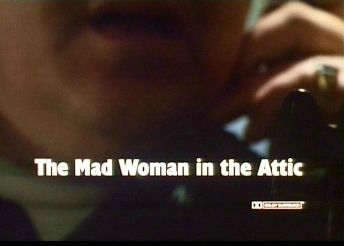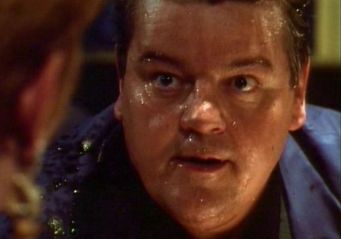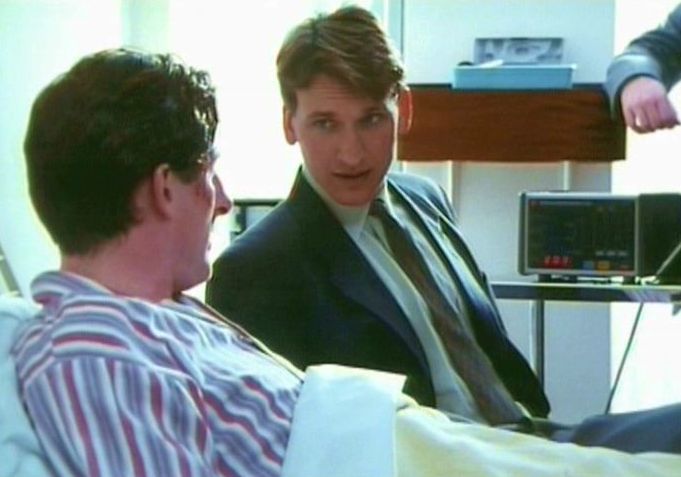
Cracker: The Mad Woman In The Attic
Year: 1993
Written by: Jimmy McGovern
Directed by: Michael Winterbottom
Starring: Robbie Coltrane, Barbara Flynn, Christopher Eccleston, Lorcan Cranitch, Geraldine Somerville and Kieran O'Brien with Adrian Dunbar, Kika Markham and John Grillo.
Duration: 98'57m
Certificate: 18
DVD Availability Try amazon (region 1)/sendit.com (region 2)
Cast (credits order): Robbie Coltrane (Fitz), Jeffrey Robert (Head of Psychology), Andy Devine (Guard on Train), Lorcan Cranitch (D.S. Beck), Christopher Eccleston (D.C.I. Bilborough), Louise Downie (Jacqui Appleby), Geraldine Somerville (D.S. Penhaligon), Ian Mercer (D.C. Giggs), Ron Meadows (Roberts), Paul Copley (Pathologist), Kerry Shale (Scene of Crime Expert), Vincent Paul Davies (Taxi Driver), Kieran O'Brien (Mark Fitzgerald), Tess Thomson (Kate Fitzgerald), Carol Kidd (Night Club Singer), Peter Faulkner (Mike), Kathy Jamieson (Jo), Paulette Constable (Waitress), Kika Markham (Ann Appleby), John Grillo (Simon Appleby), Vannessa Kirkpatrick (Newscaster), Julie Westwood (PR Woman), Adrian Dunbar (Kelly), Phillipa Howell (Dr Turner), Alan David (Hanrahan), Tony Xu (Dr Soraya), Sunetra Sarker (Receptionist), Seamus O'Neill (D.C. Jones), Renny Krupinski (Voice Expert), Fine Time Fontayne (Bookie), Danny Davies (Ticket Inspector), Alan Parkinson (Mr Hobbs), Romy Baskerville (Irene Hobbs), Daryl Fishwick (Mrs Hobbs), Edward Peel (Chief Super), David Crellin (Quinlan), Andrew Brittain (Presenter), Dianne Adderley (Mrs Royle), Nicholas Woodeson (Hennessy), Rob Palmer (Horse Racing Commentary), Nelson Fletcher (Custody Sergeant), Don Henderson (Hennessy Senior) and Amanda Loy-Ellis (Girl On Train).
Full Crew: Liam Foster (Production Manager), Ken Mair (Location Manager), Peter Shaw (First Assistant Director), Tracy Lee (Production Co-Ordinator), Dorothy Friend (Continuity), Emma Bodger (Second Assistant Director), Gareth Williams (Production Finance), Peter Brayham (Stunt Co-Ordinator), Richard Brierley (Focus Puller), Bob Gregory (Grips), David Ratcliffe (Chargehand Electrician), Peter Robertson/Alf Tramontin (Steadicam), Phil Smith (Sound Mixer), Tony Cooper (Boom Operator), John Whitworth (Dubbing Mixer), Phil Bothamley/Tim Vine/John Crumpton (Dubbing Editors), Karaoke AV LTD/Pioneer LDCE LTD (Karaoke), Deborah Morley (Art Director), Ron Pritchard (Prop Buyer), Frank Massey (Chargehand ASM), Phil Buckley (Graphic Designer), Janty Yates (Costume Designer), Sally Mason (Wardrobe Supervisor), Helen King (Make Up Supervisor), Anastasia Shirley (Make Up Assistant), Gail Stevens (Casting Director), Catriona McKenzie/Nicola Shindler (Script Editors), Gwenda Bagshaw (Script Associate), Craig McNeil (Production Executive), Roger Jackson (Music Composer/Performer), Oral Norrie Ottey (Film Editor), Ivan Strasburg (Director of Photography), Chris Wilkinson (Production Designer), Sally Head (Executive Producer) and Gub Neal (Producer). A Granada Television Production.
Trivia: This story was originally screened in a two-episode format on 27/09 and 04/10/1993. The title of the story refers to Fitz's belief that "Nobody ever loses their memory. It just gets locked away like the mad woman in the attic. Occasionally you hear her scream, but you daren't unlock the door and have a look in."
Images: Cracker: The Mad Woman In The Attic Image Page


Viewpoint:
"What made her leave you? The gambling? The drink? The fact that you're a self-loathing, arrogant, mysognistic slob?"
In the mid-90s UK TV was suffering from a glut of police detective series, so the addition of another to the schedules didn't exactly inspire. What made things worse is that it aired on ITV - Britain's major commercial channel, and one without a large reputation for quality programming over profit - and a man more known as a comedian was going to be playing the lead role, that of a criminal psychologist helping out the police. What's staggering is that Cracker turned out to not only be a highly credible television programme, but also one of the best television programmes of its era, and of all time.
With exceptional writing by Jimmy McGovern, while he went on to write a lead for Chris in Hearts and Minds (1996), it would be stretching the point to suggest that Chris was vital to Cracker's success. While the show is very much Robbie Coltrane's, and the major support the two females vying for his attention (Barbara Flynn and Geraldine Somerville), Chris heads part of a superb ensemble cast, his ambitious Bilborough already putting aside ethics in favour of results, and clashing with Coltrane's arrogant Fitz. The ultimate anti-hero, Fitz is a selfish, bullish, hard-drinking gambler, wracked by self-loathing. We see his unorthodox lecture methods and a disastrous dinner party where he drunkenly abuses two fellow guests. Tracing the line of his self-imposed misery through the story of a man slashing women on trains, then perhaps there's a lack of a real protagonist to clash intellectually or viscerally with Coltrane in this opening story, but this is still a fine introduction to arguably the finest television series of the 1990s.